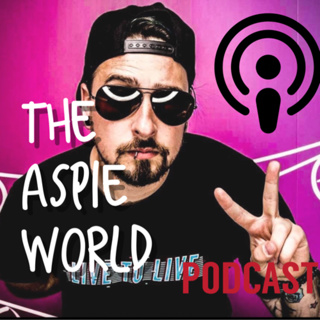
Good Doctor Memes And Autism (CONTROVERSY)
If you’ve been on social media recently, you’ve probably seen the Good Doctor memes making the rounds — and they’ve caused a lot of debate in the autism community. Are they harmless jokes, or do they promote stereotypes about autistic people?In this episode of The Aspie World Podcast, I break down the Good Doctor memes controversy, how the autistic community feels about it, and why representation in media matters more than ever.Whether you love the show, dislike it, or have never seen it, this episode dives into the bigger conversation around autism, stereotypes, and respect.Why the Good Doctor memes have sparked backlash onlineHow the show’s autism representation impacts real autistic peopleThe difference between healthy humour and harmful stereotypesWhy media portrayals shape public perception of autismHow autistic voices can guide better, authentic representationMemes can be funny — but when they reinforce damaging stereotypes, they affect how autistic people are treated in schools, workplaces, and society.Autistic adults frustrated by inaccurate representationParents wanting to understand the conversation around autism in mediaAllies who want to be respectful and supportiveAnyone curious about how TV and memes shape public understanding of autismIf you’ve ever felt misrepresented, stereotyped, or misunderstood, this episode will help you make sense of the controversy and why it matters.🎁 FREE Download: Get your Autistic Adult Bulletproof Brain Starter Kit and discover science-backed strategies to manage overwhelm, reduce stress, and boost confidence → www.bulletproofbrain.orgIf this episode helped you, please:✅ Subscribe to The Aspie World Podcast so you never miss an episode✅ Leave a review — your feedback helps us reach and support more autistic adults✅ Share this episode with friends, family, or anyone interested in autism representation in mediaTogether, we can push for better, more authentic portrayals of autistic people — on screen and online. 💙What You’ll Learn in This Episode:Who This Episode Is For:Resources & Support for Autistic AdultsLet’s Stay Connected
23 Sep 2min

Girls With AUTISM Sleep Issues (Need To KNOW!)
Did you know that autistic girls are far more likely to struggle with sleep issues than neurotypical girls — and even autistic boys? From trouble falling asleep and restless nights to sensory sensitivities and racing thoughts, sleep challenges are incredibly common but often overlooked in autistic females.In this episode of The Aspie World Podcast, I dive deep into why autistic girls experience more sleep difficulties, the science behind it, and practical strategies to improve sleep quality and reduce night-time anxiety.Why sleep issues are more common in autistic girls and womenThe role of sensory sensitivities, anxiety, and masking in poor sleepHow hormones and puberty affect autistic sleep patternsPractical strategies to improve falling asleep and staying asleepTools and routines to create a calm, autism-friendly bedtimeBetter sleep doesn’t just mean more rest — it improves emotional regulation, focus, and overall wellbeing for autistic girls.Autistic girls, teens, and women struggling with sleep problemsParents wanting to support autistic daughters with better sleep routinesTeachers, carers, and therapists looking to understand autistic sleep needsAnyone curious about how autism affects sleep differently in femalesIf bedtime has ever felt like a battle, this episode will give you practical, autism-friendly strategies you can start using tonight.🎁 FREE Download: Get your Autistic Adult Bulletproof Brain Starter Kit and discover science-backed strategies to reduce overwhelm, manage stress, and improve emotional balance → www.bulletproofbrain.orgIf you found this episode helpful, please:✅ Subscribe to The Aspie World Podcast so you never miss an episode✅ Leave a review — it helps us reach and support more autistic girls and families✅ Share this episode with friends, parents, or anyone supporting autistic females with sleep challengesWith the right tools and understanding, autistic girls can finally get the rest they need. 💜What You’ll Learn in This Episode:Who This Episode Is For:Resources & Support for Autistic AdultsLet’s Stay Connected
22 Sep 2min

Girls with Autism - How To Manage Executive Functioning
Did you know that autistic girls often struggle with executive functioning differently from boys — and yet it’s frequently misunderstood or overlooked? Tasks like planning, organising, time management, and decision-making can feel overwhelming, but with the right strategies, autistic girls and women can thrive at school, work, and beyond.In this episode of The Aspie World Podcast, I share practical tips and real-life strategies for improving executive functioning skills — specifically designed for autistic females who may experience unique challenges around masking, sensory stress, and burnout.Why executive functioning challenges are common in autistic girlsHow masking and social expectations make tasks feel harderPractical strategies to improve focus, planning, and organisationTools and routines to reduce overwhelm and decision fatigueHow to create an autism-friendly support system at home, school, or workThese aren’t generic productivity hacks — they’re autism-friendly techniques that actually work for the way your brain processes information.Autistic girls, teens, and women struggling with organisation and focusParents supporting autistic daughters through school or transitionsTeachers, carers, and therapists wanting to better support autistic femalesAnyone curious about the unique executive functioning challenges autistic girls faceIf you’ve ever felt stuck, overwhelmed, or frustrated when trying to stay organised, this episode will give you practical solutions you can start using today.🎁 FREE Download: Get your Autistic Adult Bulletproof Brain Starter Kit and discover science-backed strategies to manage executive dysfunction, reduce overwhelm, and build unstoppable confidence → www.bulletproofbrain.orgIf you found this episode helpful, please:✅ Subscribe to The Aspie World Podcast so you never miss an episode✅ Leave a review — your feedback helps us reach and support more autistic girls and women✅ Share this episode with friends, parents, teachers, or anyone supporting autistic femalesWith the right tools and support, executive functioning doesn’t have to hold you back — it can become your superpower. 💜What You’ll Learn in This Episode:Who This Episode Is For:Resources & Support for Autistic AdultsLet’s Stay Connected
21 Sep 3min

First person diagnosed with autism dies 89
The autism community has lost a truly significant figure. Donald Triplett, widely recognised as the first person ever diagnosed with autism, has passed away at the age of 89. In this episode of The Aspie World Podcast, we reflect on his incredible life, his diagnosis journey, and how his story shaped the world’s understanding of autism spectrum conditions.Donald’s life represents more than just history — it’s a reminder of how far we’ve come in autism awareness, advocacy, and research, and how much further we still need to go to support autistic adults and children worldwide.Who Donald Triplett was and why his story is historically importantHow the first official autism diagnosis helped shape modern researchWhat his life teaches us about autistic strengths and resilienceHow understanding autism has evolved since the 1940sWhy continued awareness, acceptance, and advocacy still matter todayDonald’s legacy is a powerful reminder that autistic voices deserve to be heard, celebrated, and supported — not just diagnosed.Autistic adults wanting to learn more about autism historyParents looking for insight into how autism diagnosis and support have evolvedTeachers, researchers, and professionals seeking a deeper understanding of autismAnyone curious about the pioneering story behind the world’s first autism diagnosisIf you’ve ever wondered how far autism understanding has come — and where it’s headed — this episode offers both reflection and hope.🎁 FREE Download: Get your Autistic Adult Bulletproof Brain Starter Kit and learn science-backed strategies to manage stress, reduce overwhelm, and build unstoppable confidence → www.bulletproofbrain.orgIf this episode moved you, please:✅ Subscribe to The Aspie World Podcast so you never miss future episodes✅ Leave a review — your feedback helps us reach and support more autistic adults and families✅ Share this episode with friends, family, or anyone interested in the history of autismDonald Triplett’s story paved the way for millions of autistic people worldwide. His life reminds us that autism is not a limitation — it’s a different way of experiencing the world. 💙What You’ll Learn in This Episode:Who This Episode Is For:Resources & Support for Autistic AdultsLet’s Stay Connected
20 Sep 2min

Emotional Regulation in Girls with Autism
Did you know that autistic girls often struggle with emotional regulation in ways that are different from boys — yet these challenges are frequently overlooked or misunderstood? In this episode of The Aspie World Podcast, I dive into why emotional regulation can be harder for autistic females, what’s really happening beneath the surface, and how to support autistic girls in managing big emotions.Many autistic women and girls experience intense emotions, but because they often mask their struggles, their needs go unnoticed. Understanding how autism affects emotional regulation is the first step in helping autistic girls thrive without shame, burnout, or overwhelm.Why emotional regulation challenges are common in autistic girlsHow masking and social expectations make things harderSigns your autistic daughter or student may be struggling internallySimple, practical strategies to support emotional regulationHow autistic girls can build coping tools that actually work for themThe goal isn’t to “fix” autistic girls — it’s to understand their needs and give them the tools and support they need to feel safe, seen, and understood.Parents of autistic girls seeking better support strategiesAutistic teens and young adults struggling with emotional overwhelmTeachers, carers, and therapists supporting autistic femalesAnyone wanting to understand the unique emotional needs of autistic women and girlsIf you’ve ever felt confused by emotional outbursts, meltdowns, or sudden shutdowns, this episode will give you insight, compassion, and practical solutions.🎁 FREE Download: Get your Autistic Adult Bulletproof Brain Starter Kit and discover science-backed strategies to manage emotions, reduce overwhelm, and build unstoppable confidence → www.bulletproofbrain.orgIf you found this episode helpful, please:✅ Subscribe to The Aspie World Podcast so you never miss an episode✅ Leave a review — your feedback helps more autistic people and families find this content✅ Share this episode with friends, parents, teachers, or anyone supporting autistic girlsWhen we understand autistic emotions, we can create safer, more supportive environments where girls can thrive authentically. 💜What You’ll Learn in This Episode:Who This Episode Is For:Resources & Support for Autistic AdultsLet’s Stay Connected
19 Sep 3min

Do You Love Someone Diagnosed With Autism? (What To Do)
Loving someone with autism can be an amazing journey, but it also comes with unique challenges that many people aren’t prepared for. Whether it’s your partner, child, friend, or family member, understanding their needs is the key to building a stronger, healthier relationship.In this episode of The Aspie World Podcast, I’m sharing practical tips, emotional insights, and real-life strategies to help you support and connect with the autistic people you love — without forcing masking, changing who they are, or misunderstanding their needs.How autism affects communication, emotions, and daily lifeThe do’s and don’ts of supporting someone diagnosed with autismHow to navigate relationships without misunderstandings or frustrationTips to reduce sensory stress and emotional overwhelmWhy acceptance, patience, and understanding make the biggest differenceWhen you truly understand autism, you create space for real connection and authentic relationships.Partners of autistic adults looking to improve their relationshipParents and carers supporting autistic children or teensFriends and family members who want to better understand autismAnyone wanting to build stronger, healthier relationships with autistic peopleIf you love someone on the autism spectrum, this episode will give you the tools, knowledge, and confidence to support them while celebrating who they are.🎁 FREE Download: Get your Autistic Adult Bulletproof Brain Starter Kit and discover science-backed strategies to manage stress, build confidence, and improve communication → www.bulletproofbrain.orgIf this episode helped you, please:✅ Subscribe to The Aspie World Podcast so you never miss future episodes✅ Leave a review — your feedback helps us reach and support more autistic adults and families✅ Share this episode with friends, family, or anyone who loves someone diagnosed with autismRemember: love plus understanding creates the strongest relationships. 💙What You’ll Learn in This Episode:Who This Episode Is For:Resources & Support for Autistic AdultsLet’s Stay Connected
18 Sep 4min

Do You Have Autism And OCD_ (MUST SEE)
Did you know that autistic people are more likely to experience OCD — but it’s often misunderstood or missed completely? In this episode of The Aspie World Podcast, I break down the connection between autism and obsessive-compulsive disorder, how to spot the signs, and what you can do if you think you might have both conditions.Many autistic adults live with undiagnosed OCD because the traits can overlap or get mislabelled as “just autism.” Understanding the difference can reduce anxiety, improve coping strategies, and help you get the right support.The key differences between autistic repetitive behaviours and OCD compulsionsWhy autistic people are more prone to OCD than neurotypical individualsSigns you may have OCD alongside autismStrategies for managing obsessive thoughts and ritualsWhere to find help, diagnosis, and effective treatmentsWhether you’re an autistic adult, a parent, or someone trying to understand yourself better, this episode gives you the tools to recognise symptoms and get support.Autistic adults who suspect they may also have OCDParents supporting autistic children with obsessive behavioursTeachers, carers, and therapists working with autistic individualsAnyone curious about the link between autism and OCDUnderstanding how autism and OCD overlap can be life-changing — it’s the first step to getting clarity and building better coping strategies.🎁 FREE Download: Get your Autistic Adult Bulletproof Brain Starter Kit and learn science-backed strategies to reduce anxiety, manage overwhelm, and build unstoppable confidence → www.bulletproofbrain.orgIf this episode helped you, please:✅ Subscribe to The Aspie World Podcast so you never miss an episode✅ Leave a review — it helps us reach and support more autistic adults✅ Share this episode with friends, family, or anyone exploring the autism and OCD connectionYou deserve clarity — and with the right knowledge and tools, you can take back control of your mental health. 💙What You’ll Learn in This Episode:Who This Episode Is For:Resources & Support for Autistic AdultsLet’s Stay Connected
17 Sep 3min

Autistic People Die Early!?
Research shows that autistic people have a significantly shorter life expectancy compared to non-autistic people — but why? In this important episode of The Aspie World Podcast, we dive into the shocking statistics, the real reasons behind this life expectancy gap, and what can be done to change it.This is a sensitive but vital topic for autistic adults, parents, and professionals. By understanding the hidden challenges autistic people face — from mental health struggles and sensory stress to systemic neglect — we can work together to create safer, healthier, and longer lives for the autistic community.The latest research on why autistic people die youngerThe link between mental health, stress, and life expectancyHow undiagnosed health issues impact autistic adultsWhy sensory overload and burnout contribute to poor healthPractical steps autistic adults and families can take to protect wellbeingThis isn’t about fear — it’s about empowerment. Understanding the risks means we can change the outcomes.Autistic adults wanting to protect their health and wellbeingParents of autistic kids looking for early intervention strategiesTeachers, carers, and professionals supporting autistic peopleAnyone wanting to understand the health challenges autistic people faceBy raising awareness, we can push for better support, improved healthcare, and safer systems for the autistic community.🎁 FREE Download: Get your Autistic Adult Bulletproof Brain Starter Kit and learn science-backed strategies to manage stress, improve mental health, and protect your long-term wellbeing → www.bulletproofbrain.orgIf this episode helped you, please:✅ Subscribe to The Aspie World Podcast so you never miss an episode✅ Leave a review — your feedback helps us reach and support more autistic adults and families✅ Share this episode with friends, family, or anyone who needs to understand why autistic health outcomes matterTogether, we can raise awareness, drive change, and create a safer future for autistic people everywhere. 💙What You’ll Learn in This Episode:Who This Episode Is For:Resources & Support for Autistic AdultsLet’s Stay Connected
16 Sep 3min





















